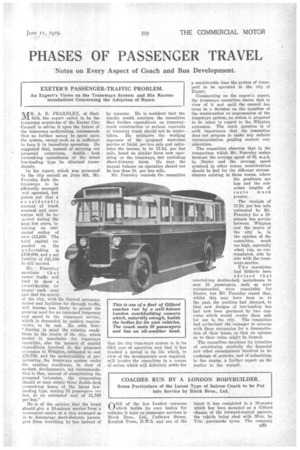PHASES OF PASSENGER TRAVEL
Page 65

If you've noticed an error in this article please click here to report it so we can fix it.
'Notes on Every Aspect of Coach and Bus Development.
R. A. R. FEARNLEY, of Shef field, the expert called in by the tramways counnietee of the Exeter City Council to advise it upon the future of the tramways undertaking, recommends that no further money be spent upon the system, except such as is sufficient to keep it in immediate operation. He suggested that, instead of carrying out proposed extensions, double deck covered-top motorbuses of the latest low-loading type be obtained immediately.
In his report, which was presented to the city council on June 4th, Mr. Fearnley finds the trantwayzz; to be efficiently managed and operated, but points out that a co nsiderable amount of track renewal and renovation will be required during the next few years, involving an estimated outlay of over i.12,000. The total capital expended on the undertaking is £109,000, and a net liability of £41180 is still carried.
Mr. Fearn1 mentions that motor traffic will tend to show a en n si derable in crease each year . and that the centre of the city, with its linuted accommodation and facilities for through .traffic, will become less likely to permit the growing need for an increased frequency and speed in the tramways service,. which is demanded by. modern requirements, to be . met. . lae adds that : "Having in mind the existing conditions in the:centre of the city, which render it unsuitable for tramways operation, also the amount of capital expenditure involved in the proposed extension to Whipton, estimated to cost -120,750, and the undesirability of perpetuating. the tramways system under the existing conditions, . in view of modern developments, my recommendation is that, instead of constructing the proposed 'extension, the corporation should at once obtain three double-deck covered-top buses of the latest lowloading type, seating 51 passengers nor bus, at an • estimated cost of £1,798 per bin."
He is of the opinion that the buses should give a 10-Minute service front's, convenient centre at. a fare arranged so as to discourage short-distance passengers from travelling by bus instead of
by tramcar. He is confident that the results woulci_convince the committee that further expenditure on tramwaytrack construction or serious renewals of tramway track should not be undertaken. He estimates the working expenses of the proposed motorbus service at 14.5d. per bus mile and calculates the income to be 1711d. per bus mile, based on similar fares now operating on the tramways, but excluding short-distance fares. Ile says the annual balance on operation should not be less than 3d. per bus mile.
Mr. Fearnley reminds the committee
hat the city tramways system is in its 24th year of operation' and that it has reached a period in its life which, in view of the developments now required, will involve the committee in a course Of action which will definitely settle for
a considerable time the system of transport to be operated in the city of Exeter.
Commenting on the expert's report, the tramways committee states that in view of it and until the council has come to a decision on the question of the continuation or supersession of the tramways system, no action is proposed to be taken in regard to the Whipton extension. The main question is of such importance that the committee does not propose to make any definite recommendation pending mature consideration.
The committee observes that in the comparison which Mr. Fearnley makes between the average speed of Olt m.p.h. in Exeter and the average speed attained in other towns, consideration simuld be had for the different circumstances existing in those town,s, where the gradients are less and the suburban lengths of route much greater.
The receipts of 17.5d. per bus mile estimated by Mr. Fearnley for a 10minute bus service between Whipton and the centre of the city is, in the opinion of the committee, much too high, especially when run, as contemplated, side by side with the tramways service.
T h e committee had hitherto been advised that covered-top double-deck motorbuses to seat 51 passengers, such as were 'recommended, were unsuitable for Exeter, but MI'. Fearnley stated that, whilst this may have been so in the past, the position had changed, in that new designs of low-loading bus had now been produced by two concerns which would render them safe for use in the city. The committee had authorised the manager to arrange with these companies for a demonstration of their buses, so that an opinion as to their value might be formed.
The committee mentions its intention of considering carefully the financial and other consequences involved in an exchange of systems, and of submitting, in due course, a further report on the matter to the council.




















































































































